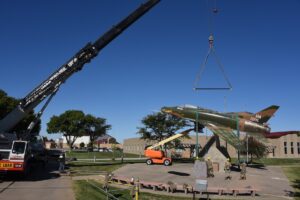Published May 31, 2022
By Air Force Senior Master Sgt. Vincent De Groot
185th Air Refueling Wing
SIOUX CITY, IA — When the U.S. Air Force F-100 Super Sabre that was on static display in Sioux City, Iowa was removed from its prominent position last fall the timing for a much needed makeover was perfect.
The Vietnam War era fighter jet at the Iowa Air National Guard looks like new again after being repaired and repainted. The restoration came just in time as the U.S. Air Force marks its 75th Anniversary this year.
With its signature oval nose, curved fuselage and flat bottom the 1950’s era swept wing jet resembles a Formula 1 race car of the same time period. Every inch of the North American Aviation engineered aircraft was built for speed. Known as a “century series” fighter because of the “100” designation, the 2nd generation fighter was the first production run of supersonic fighters created for the U.S. Air Force.
Like many Air National Guard units the 174th Fighter Squadron of the Iowa Air Guard was first allocated aircraft, pilots and maintainers in 1946 following the 2nd World War. Fixed-wing flying units were not part of the newly formed Air National Guard however until a year later, when in September of 1947 the Air Force officially became a separate service.
The Iowa Air Guard’s 185th Air Refueling Wing, as it is known today had originally flown single seat fighter aircraft when they received castoff P-51 Mustangs after the war. The unit was equipped with variations of F-80 fighter jets during the 1950s but when the unit receive the F-100 in 1961 they had officially made the leap into the supersonic jet age.
In the years to follow the F-100 would go on to become a significant part of U.S. Air Force and Air National Guard history. During their 16 year run with the Super Sabre, the 174th Tactical Fighter Squadron was one of only four Air National Guard Fighter units who deployed with the F-100 for a yearlong deployment to Vietnam.
The 174th was joined by Colorado’s 120th, New Mexico’s 188th and New York’s 136th Tactical Fighter Squadrons, where each unit served a full year at air bases in South Vietnam starting in 1968. A fifth group of volunteer guard members from New Jersey and Washington, D.C. made up an active duty squadron, the 355th TFS, who also flew the F-100.
After their arrival in Vietnam, Air National Guard F-100 units quickly achieved the status being among most effective close air support units in theater. Their performance during that time permanently erased the “flying club” image of the guard. The five squadrons accumulated a combined 30,000 combat sorties during their deployment to South Vietnam.
Much of the guard success of getting bombs on target and keeping aircraft flying was attributed to the maturity and experience of ANG pilots. Another significant contributing factor to their success was the combination of stability and ownership that ANG maintainers have with their aircraft.
During the 1970s Air Guard maintainers were credited with a significant F-100 upgrade when they were granted additional autonomy that came with sole ownership of the F-100. ANG maintainers, who F-100 “Misty” pilot Jack Doub referred to as “really smart Air National Guard guys” retrofitted the F-100 with afterburners from retired F-102 aircraft. The improvement solved long standing issues with engine performance while solidifying the unique, total force contributions of the Air National Guard.
After giving up the Super Sabre in July 1977 the F-100 held the honor of being the longest piloted airframe in the Iowa Guard unit until a few years ago when it was surpassed by their current KC-135. In November of 2023 the unit will mark its 20th year flying the KC-135 Stratotanker.
Even after sixty years the recent F-100 restoration project had new 185th Fabrication Specialists honing freshly acquired tech school skills repairing badly deteriorated wing trailing edges. Other repairs, combined with the efforts of the co-located Air National Guard paint facility, ensured a high quality finished product that will keep the old aircraft in good shape for another 20 years.
The old jet with the iconic Sioux City “HA” on its tail is now ready to go back on its pedestal where it will serve as a tribute to Air National Guard members past and present. The aircraft will again serve as a reminder of the shared heritage and contributions of those who flew and fixed the “HUN” for years to come.(1)

